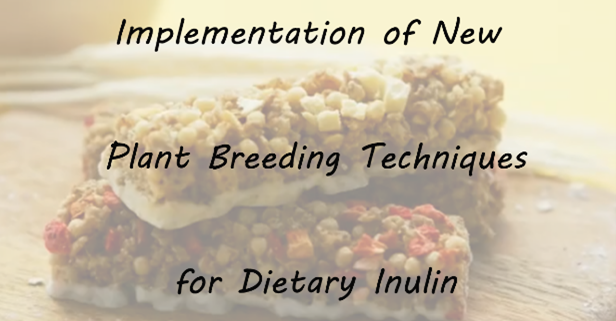Implementation of NPBT for Dietary Inulin Update
CHIC is the Chicory Innovation Consortium. The project’s main objectives are 1) to implement New Plant Breeding Techniques (NPBTs) in chicory in order to establish it as a multipurpose crop for the production of health-related products with clear benefits for consumers, and 2) to develop co-innovation pathways with stakeholders for game-changing technologies, such as NPBTs.
The overall objective of Work Package 2 (WP2) is to develop NPBT-based chicory varieties with improved dietary inulin quality.
Specific objectives are:
- To control and increase the inulin polymer length (increase the mean degree of polymerization, mDP)
- To increase the yield of inulin
- To reduce the presence of small sugars and bitter compounds (terpenes that hinder the extraction of inulin
Updates
Inulin is a dietary fiber with health-promoting characteristics mainly targeting gut health and extracted from root chicory, which is used in many food products. The quality and the length of the inulin molecules determine the value and health-beneficial character of this compound. Using NPBTs, researchers want to increase the yield, quality, and length of inulin.
Currently, the natural production of terpenes in chicory makes the inulin extraction method inefficient and costly and one of its goals is to reduce the production of natural chicory terpenes.
Researchers found that they could generate mutant chicory plants in which the genes encoding the inulin break-down enzymes are blocked using NPBT due to the small alterations the CRISPR tools made in the plant DNA. All mutated plants were then analyzed in great detail on DNA level using sequencing methods.
Root cuttings allowed the selected mutants to be multiplied and used for induction experiments of inulin break-down to show the effect of the targeted mutations on inulin quality and profile under autumn/winter conditions. The mutants in which all FEH genes were targeted showed the desired effect on blocking degradation of inulin by FEH enzyme activity under autumn/winter conditions, resulting in high-quality inulin with a low level of small sugars and longer inulin molecules, with an increased mean degree of polymerisation (mDP).
Researchers could also show that mutants of terpene biosynthesis generated in work package 1 in which the Germacrene A Synthase (Gas) genes were targeted are strongly reduced in the synthesis of bitter compounds, or total lack the bitter compounds.


 This project has received funding from the EU Horizon 2020 research & innovation programme under grant agreement N. 760891.
This project has received funding from the EU Horizon 2020 research & innovation programme under grant agreement N. 760891.

